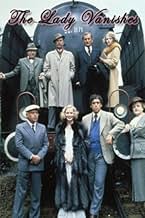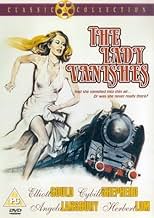IMDb-BEWERTUNG
6,0/10
3195
IHRE BEWERTUNG
Füge eine Handlung in deiner Sprache hinzuOn a train in Germany, American heiress Amanda Kelly befriends older nanny Miss Froy. When Miss Froy vanishes, everyone Amanda asks denies having seen her. Eventually, Amanda persuades Ameri... Alles lesenOn a train in Germany, American heiress Amanda Kelly befriends older nanny Miss Froy. When Miss Froy vanishes, everyone Amanda asks denies having seen her. Eventually, Amanda persuades American photographer Bob Condon to help her search.On a train in Germany, American heiress Amanda Kelly befriends older nanny Miss Froy. When Miss Froy vanishes, everyone Amanda asks denies having seen her. Eventually, Amanda persuades American photographer Bob Condon to help her search.
Gary McDermott
- Baroness's Manservant
- (as Garry McDermott)
Empfohlene Bewertungen
There was no need for this movie to be made (but that is true for most remakes). The original is a classic and generally considered the best of Hitchcock's early British films. But if you forget about the comparisons and let this remake stand on its own, it's actually pretty decent: good-looking, beautifully scored, and well-cast, even in the secondary roles. The two leads are likably goofy (they do bring a 70's flavor to these 30's characters, which may or may not be to your taste), and male viewers will be glad to know that Cybill Shepherd spends the entire running time wearing a white dress that reveals her sexy back, arms and shoulders. If I can point one flaw in this movie, it's that the script doesn't build enough ambiguity - even people who don't know the story won't think for a moment that it could all be "in Cybill's head". But it's clear that the intention here was to create a light comedy-mystery, not a suspense classic. (**1/2)
There's a strong tendency to compare Hitchcock's version of "The Lady Vanishes" with the 1979 version starring Elliot Gould, Cybill Shepherd, and Angela Lansbury. There's no need to do so. Both have the same title but entirely different moods. This doesn't make one "better" or "worse" than the other. They just should be judged on their own merits.
Both are thrillers, one more somber and tense, and the latter version more of a melodramatic mystery with comedic touches.
What I would suggest is that the viewer simply watch both versions, recognizing the strong and weak points of each. Both are enjoyable, but to interject a personal note, I tend to lean toward this 1979 version for its tone that's more like other mystery films such as "Charade" or "North By Northwest".
Enjoy them both as different cinematic expressions and let others worry about comparisons.
Both are thrillers, one more somber and tense, and the latter version more of a melodramatic mystery with comedic touches.
What I would suggest is that the viewer simply watch both versions, recognizing the strong and weak points of each. Both are enjoyable, but to interject a personal note, I tend to lean toward this 1979 version for its tone that's more like other mystery films such as "Charade" or "North By Northwest".
Enjoy them both as different cinematic expressions and let others worry about comparisons.
Hammer's lamentable remake of a Hitchcock classic and unsurprisingly the studio's last picture – at least until their recent reinvention as a purveyor of horror fare. THE LADY VANISHES is an odd film indeed, one that veers unevenly between comedy, mystery and thrills and never really succeeds in any of those fields: the comedy's unfunny, the mystery's obvious and the thrills muted. It doesn't help that the lead actress – Cybill Shepherd – is horribly miscast, giving a performance so awful that some viewers may turn off because of her alone.
Then again, Shepherd may not be entirely at fault – I struggle to think of an alternative actress who could have brought her shrill, screechy character to life. I generally enjoy films set aboard trains, planes, boats etc. but this one never makes good use of the location and the constant moving between carriages and compartments becomes repetitive in the extreme (although a late stage train-climbing stunt sequence is breathtakingly good).
Elliott Gould seems distinctly embarrassed by his presence here and can do nothing with his character, while Angela Lansbury seems to think she's still in BEDKNOBS & BROOMSTICKS and gives a patronising turn. It's left to the Arthur Lowe and Ian Carmichael to supply some genuine humour, although sadly their characters are ill-utilised and kept off-screen for the most part. THE LADY VANISHES marks an ignoble end for a once-fine studio and languishes today as a deservedly forgotten oddity.
Then again, Shepherd may not be entirely at fault – I struggle to think of an alternative actress who could have brought her shrill, screechy character to life. I generally enjoy films set aboard trains, planes, boats etc. but this one never makes good use of the location and the constant moving between carriages and compartments becomes repetitive in the extreme (although a late stage train-climbing stunt sequence is breathtakingly good).
Elliott Gould seems distinctly embarrassed by his presence here and can do nothing with his character, while Angela Lansbury seems to think she's still in BEDKNOBS & BROOMSTICKS and gives a patronising turn. It's left to the Arthur Lowe and Ian Carmichael to supply some genuine humour, although sadly their characters are ill-utilised and kept off-screen for the most part. THE LADY VANISHES marks an ignoble end for a once-fine studio and languishes today as a deservedly forgotten oddity.
Remake of a British 1938 Michael Redgrave film with Dame Mae Witty and Margaret Lockwood. The 1979 version, done as a Cybill Shepherd and Elliott Gould vehicle, pushes mainly its comedic/farcical elements instead of it being s legitimate mystery itself. The political intrigues and treacheries of the years between the First and Second World Wars made a better basis for the 1938 film than the 1979 film had. Alfred Hitchcock had still been in Britain when his 1938 film was made. Hitchcock had a sure hand utilizing the looming dangers and unease of the time, just one year prior to Britain's actual 1939 entry into WWII. The 1979 film isn't rotten but it simply doesn't hold up when weighed against Hitchcock's original. If you watch the 1979 movie, do so expecting a comedy not a mystery, and do so before you ever have seen the Hitchcock version.
It's an unpopular and even downright blasphemous idea to remake a great Alfred Hitchcock classic. It is now, and it definitely was in the late 70s, when the Master of Suspense himself was still alive. "The Lady Vanishes" flopped at the box office, received harshly negative reviews, was the symbolical last effort of Hammer Studios, and still isn't very appreciated nowadays based on the other user-comments around here.
And yet, I personally feel that "The Lady Vanishes" deserves a bit more recognition and praise, and this for the plain and simple fact that I found it very amusing. The plot is still compelling four decades later, the cast is tremendous, Cybill Shepard never looked more gorgeous than here in her white dress, and random conversations about cricket were never as funny.
Reverting to comparisons between this version and Hitchcock's classic is inevitable, though. The 1979 update is undeniably weaker for two reasons. First, because here there never is any doubt whether there was a Miss Froy who suddenly vanishes from the train departing from Bavaria. Shepard's character Kelly is very certain of herself and doesn't allow anyone to convince her otherwise, and it also doesn't help that we follow Miss Froy (Angela Lansbury) throughout the entire "Sound of Music" reminiscent opening credit sequences as she walks down a mountain and checks into a hotel. Secondly, there's the hindsight effect. What I mean by this is that Hitchcock's original was made and released in 1938; - slightly more than a year before the outbreak of WWII. Hitch made fabulous use of the contemporary political tensions and social unrest, and it greatly benefitted the atmosphere of his film. Anthony Page, like every other director since 1945, is forced to approach the plot with hindsight and that simply cannot be as intense.
Never mind the negativity, though, and enjoy "The Lady Vanishes" with all its misplaced comedy and unspectacular action. Cybill's best line: "despite your ridiculous haircut, I'm falling for you". Because, let's face it, Elliot Gould's hair is quite silly.
And yet, I personally feel that "The Lady Vanishes" deserves a bit more recognition and praise, and this for the plain and simple fact that I found it very amusing. The plot is still compelling four decades later, the cast is tremendous, Cybill Shepard never looked more gorgeous than here in her white dress, and random conversations about cricket were never as funny.
Reverting to comparisons between this version and Hitchcock's classic is inevitable, though. The 1979 update is undeniably weaker for two reasons. First, because here there never is any doubt whether there was a Miss Froy who suddenly vanishes from the train departing from Bavaria. Shepard's character Kelly is very certain of herself and doesn't allow anyone to convince her otherwise, and it also doesn't help that we follow Miss Froy (Angela Lansbury) throughout the entire "Sound of Music" reminiscent opening credit sequences as she walks down a mountain and checks into a hotel. Secondly, there's the hindsight effect. What I mean by this is that Hitchcock's original was made and released in 1938; - slightly more than a year before the outbreak of WWII. Hitch made fabulous use of the contemporary political tensions and social unrest, and it greatly benefitted the atmosphere of his film. Anthony Page, like every other director since 1945, is forced to approach the plot with hindsight and that simply cannot be as intense.
Never mind the negativity, though, and enjoy "The Lady Vanishes" with all its misplaced comedy and unspectacular action. Cybill's best line: "despite your ridiculous haircut, I'm falling for you". Because, let's face it, Elliot Gould's hair is quite silly.
Wusstest du schon
- WissenswertesThough Cybill Shepherd only wears one costume in the movie, (a bias-cut white satin dress), the costume department made nine identical copies to facilitate filming.
- PatzerNear the end of the movie, when the train is backed up to the yard, and Amanda has switched the points, she runs towards the train as it is leaving. The track they pass over passes the locomotive when the camera shows Robert reaching for her, but when the camera shows her running, she has yet to run over the track until the end, when Robert picks her up.
- VerbindungenFeatured in Siskel & Ebert & the Movies: Hail, Hail, Black and White (1989)
Top-Auswahl
Melde dich zum Bewerten an und greife auf die Watchlist für personalisierte Empfehlungen zu.
Details
- Erscheinungsdatum
- Herkunftsland
- Sprachen
- Auch bekannt als
- La dama desaparece
- Drehorte
- Produktionsfirmen
- Weitere beteiligte Unternehmen bei IMDbPro anzeigen
Box Office
- Budget
- 2.500.000 £ (geschätzt)
- Laufzeit
- 1 Std. 37 Min.(97 min)
- Sound-Mix
- Seitenverhältnis
- 2.35 : 1
Zu dieser Seite beitragen
Bearbeitung vorschlagen oder fehlenden Inhalt hinzufügen



































